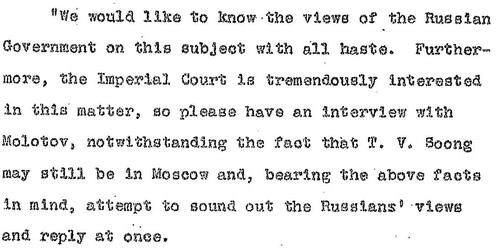
An excerpt from a July 12, 1945 US War Department summary of an intercepted cable from Japanese Foreign Minister Shigenori Togo to his ambassador to Russia
Posted on 08/06/2023 7:01:59 PM PDT by SeekAndFind
The anniversaries of the atomic bombings of Hiroshima and Nagasaki present an opportunity to demolish a cornerstone myth of American history — that those twin acts of mass civilian slaughter were necessary to bring about Japan’s surrender, and spare a half-million US soldiers who’d have otherwise died in a military conquest of the empire’s home islands.
Those who attack this mythology are often reflexively dismissed as unpatriotic, ill-informed or both. However, the most compelling witnesses against the conventional wisdom were patriots with a unique grasp on the state of affairs in August 1945 — America’s senior military leaders of World War II.
Let’s first hear what they had to say, and then examine key facts that led them to their little-publicized convictions:
General Dwight Eisenhower on learning of the planned bombings: “I had been conscious of a feeling of depression and voiced to [Secretary of War Stimson] my grave misgivings, first on the basis of my belief that Japan was already defeated and that dropping the bomb was completely unnecessary, and secondly because I thought that our country should avoid shocking world opinion by the use of a weapon whose employment was, I thought, no longer mandatory as a measure to save American lives. It was my belief that Japan was, at that very moment, seeking some way to surrender with a minimum loss of ‘face’.”
Admiral William Leahy, Truman's Chief of Staff: “The use of this barbarous weapon…was of no material assistance in our war against Japan. The Japanese were already defeated and ready to surrender because of the effective sea blockade and the successful bombing with conventional weapons.”
Major General Curtis LeMay, 21st Bomber Command: “The war would have been over in two weeks without the Russians entering and without the atomic bomb…The atomic bomb had nothing to do with the end of the war at all.”
General Hap Arnold, US Army Air Forces: “The Japanese position was hopeless even before the first atomic bomb fell, because the Japanese had lost control of their own air.” “It always appeared to us that, atomic bomb or no atomic bomb, the Japanese were already on the verge of collapse.”
Ralph Bird, Under Secretary of the Navy: “The Japanese were ready for peace, and they already had approached the Russians and the Swiss…In my opinion, the Japanese war was really won before we ever used the atom bomb.”
Brigadier General Carter Clarke, military intelligence officer who prepared summaries of intercepted cables for Truman: “When we didn’t need to do it, and we knew we didn’t need to do it…we used [Hiroshima and Nagasaki] as an experiment for two atomic bombs. Many other high-level military officers concurred.”
Fleet Admiral Chester Nimitz, Pacific Fleet commander: “The use of atomic bombs at Hiroshima and Nagasaki was of no material assistance in our war against Japan. The Japanese were already defeated and ready to surrender.”
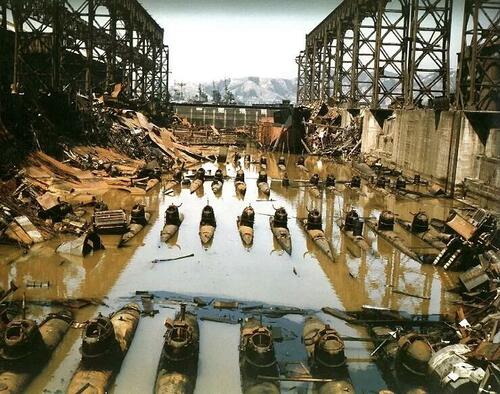
Putting out feelers through third-party diplomatic channels, the Japanese were seeking to end the war weeks before the atomic bombings on August 6 and 9, 1945. Japan’s navy and air forces were decimated, and its homeland subjected to a sea blockade and allied bombing carried out against little resistance.
The Americans knew of Japan’s intent to surrender, having intercepted a July 12 cable from Japanese Foreign Minister Shigenori Togo, informing Japanese ambassador to Russia Naotake Sato that “we are now secretly giving consideration to the termination of the war because of the pressing situation which confronts Japan both at home and abroad.”
Togo told Sato to “sound [Russian diplomat Vyacheslav Molotov] out on the extent to which it is possible to make use of Russia in ending the war.” Togo initially told Sato to obscure Japan’s interest in using Russia to end the war, but just hours later, he withdrew that instruction, saying it would be “suitable to make clear to the Russians our general attitude on ending the war”— to include Japan’s having “absolutely no idea of annexing or holding the territories which she occupied during the war.”
An excerpt from a July 12, 1945 US War Department summary of an intercepted cable from Japanese Foreign Minister Shigenori Togo to his ambassador to Russia
Japan’s central concern was the retention of its emperor, Hirohito, who was considered a demigod. Even knowing this — and with many US officials feeling the retention of the emperor could help Japanese society through its postwar transition —the Truman administration continued issuing demands for unconditional surrender, offering no assurance that the emperor would be spared humiliation or worse.
In a July 2 memorandum, Secretary of War Henry Stimson drafted a terms-of-surrender proclamation to be issued at the conclusion of that month’s Potsdam Conference. He advised Truman that, “if…we should add that we do not exclude a constitutional monarchy under her present dynasty, it would substantially add to the chances of acceptance.”
Truman and Secretary of State James Byrnes, however, continued rejecting recommendations to give assurances about the emperor. The final Potsdam Declaration, issued July 26, omitted Stimson’s recommended language, sternly declaring, “Following are our terms. We will not deviate from them.”
One of those terms could reasonably be interpreted as jeopardizing the emperor: “There must be eliminated for all time the authority and influence of those who have deceived and misled the people of Japan into embarking on world conquest.”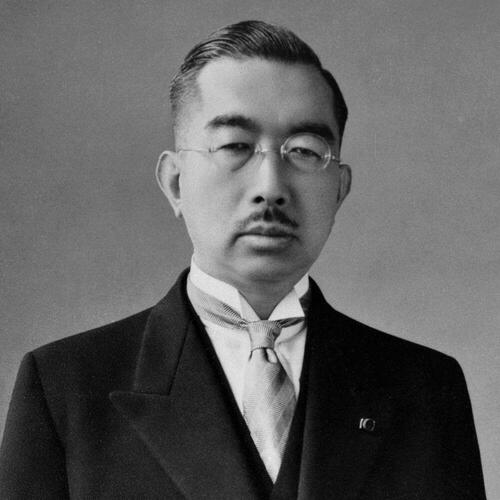
Japanese emperor Hirohito reigned from 1926 to 1989
At the same time the United States was preparing to deploy its formidable new weapons, the Soviet Union was moving armies from the European front to northeast Asia.
In May, Stalin told the US ambassador that Soviet forces should be positioned to attack the Japanese in Manchuria by August 8. In July, Truman predicted the impact of the Soviets opening a new front. In a diary entry made during the Potsdam Conference, he wrote that Stalin assured him “he’ll be in the Jap War on August 15th. Fini Japs when that comes about.”
Right on Stalin’s original schedule, the Soviet Union declared war on Japan two days after the August 6 bombing of Hiroshima. That same day — August 8 — Emperor Hirohito told the country’s civilian leaders that he still wanted to pursue a negotiated surrender that would preserve his reign.
On August 9, Soviet attacks commenced on three fronts. News of Stalin’s invasion of Manchuria prompted Hirohito to call a new meeting to discuss surrender — at 10 am, one hour before the strike on Nagasaki. The final surrender decision came on August 10.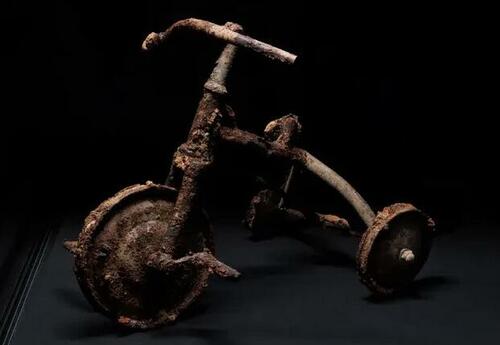
Three-year old Shinichi Tetsutani, burned as he was riding this tricycle when the atomic bomb hit Hiroshima, died a painful death that night (Hiroki Kobayashi/National Geographic)
The Soviet timeline makes the atomic bombings all the more troubling: One would think a US government that’s appropriately hesitant to incinerate and irradiate hundreds of thousands of civilians would want to first see how a Soviet declaration of war affected Japan’s calculus.
As it turns out, the Japanese surrender indeed appears to have been prompted by the Soviet entry into the war on Japan — not by the atomic bombs. “The Japanese leadership never had photo or video evidence of the atomic blast and considered the destruction of Hiroshima to be similar to the dozens of conventional strikes Japan had already suffered,” wrote Josiah Lippincott at The American Conservative.
Sadly, the evidence points to a US government determined to drop atomic bombs on Japanese cities as an end in itself, to such an extent that it not only ignored Japan’s interest in surrender, but worked to ensure that surrender was delayed until after upwards of 210,000 people — disproportionately women, children and elderly — were killed in the two cities.
Make no mistake: This was a deliberate targeting of civilian populations. Hiroshima and Nagasaki were chosen because they were pristine, and could thus fully showcase the bombs’ power. Hiroshima was home to a small military headquarters, but the fact that both cities had gone untouched by a strategic bombing campaign that began 14 months earlier certifies their military and industrial insignificance.
“The Japanese were ready to surrender and it wasn’t necessary to hit them with that awful thing,” Eisenhower would later say. “I hated to see our country be the first to use such a weapon.”
According to his pilot, General Douglas MacArthur, commander of US Army Forces Pacific, was “appalled and depressed by this Frankenstein monster.”
“When I asked General MacArthur about the decision to drop the bomb,” wrote journalist Norman Cousins, “I was surprised to learn he had not even been consulted…He saw no military justification for the dropping of the bomb. The war might have ended weeks earlier, he said, if the United States had agreed, as it later did anyway, to the retention of the institution of the emperor.”
What then, was the purpose of devastating Hiroshima and Nagasaki with atomic bombs?
A key insight comes from Manhattan Project physicist Leo Szilard. In 1945, Szilard organized a petition, signed by 70 Manhattan Project scientists, urging Truman not to use atomic bombs against Japan without first giving the country a chance to surrender, on terms that were made public.
In May 1945, Szilard met with Secretary of State Byrnes to urge atomic restraint. Byrnes wasn’t receptive to the plea. Szilard — the scientist who’d drafted the pivotal 1939 letter from Albert Einstein urging FDR to develop an atomic bomb — recounted:
"[Byrnes] was concerned about Russia's postwar behavior. Russian troops had moved into Hungary and Rumania, and Byrnes thought it would be very difficult to persuade Russia to withdraw her troops from these countries, that Russia might be more manageable if impressed by American military might, and that a demonstration of the bomb might impress Russia."
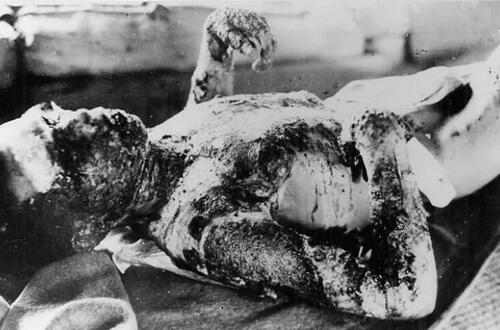
Whether the atomic bomb’s audience was in Tokyo or Moscow, some in the military establishment championed alternative ways to demonstrate its power.
Lewis Strauss, Special Assistant to the Navy Secretary, said he proposed “that the weapon should be demonstrated over… a large forest of cryptomeria trees not far from Tokyo. The cryptomeria tree is the Japanese version of our redwood… [It] would lay the trees out in windrows from the center of the explosion in all directions as though they were matchsticks, and, of course, set them afire in the center. It seemed to me that a demonstration of this sort would prove to the Japanese that we could destroy any of their cities at will.”
Strauss said Navy Secretary Forrestal “agreed wholeheartedly,” but Truman ultimately decided an optimal demonstration required burning hundreds of thousands of noncombatants and laying waste to their cities. The buck stops there.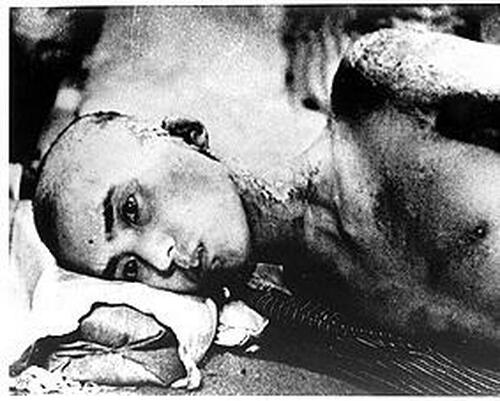
A victim of the atomic bomb
The particular means of inflicting these mass murders — a solitary object dropped from a plane at 31,000 feet — helps warp Americans’ evaluation of its morality. Using an analogy, historian Robert Raico cultivates ethical clarity:
“Suppose that, when we invaded Germany in early 1945, our leaders had believed that executing all the inhabitants of Aachen, or Trier, or some other Rhineland city would finally break the will of the Germans and lead them to surrender. In this way, the war might have ended quickly, saving the lives of many Allied soldiers. Would that then have justified shooting tens of thousands of German civilians, including women and children?”
The claim that dropping the atomic bombs saved a half-million American lives is more than just empty: Truman’s stubborn refusal to provide advance assurances about the retention of Japan’s emperor arguably cost American lives.
That’s true not only of a war against Japan that lasted longer than it needed to, but also of a Korean War precipitated by the US-invited Soviet invasion of Japanese-held territory in northeast Asia. More than 36,000 US service members died in the Korean War — among a staggering 2.5 million total military and civilian dead on both sides of the 38th Parallel.
We like to think of our system as one in which the supremacy of civilian leaders acts as a rational, moderating force on military decisions. The needless atomic bombing of Hiroshima and Nagasaki — against the wishes of World War II’s most revered military leaders — tells us otherwise.
Sadly, the destructive effects of the Hiroshima myth aren’t confined to Americans’ understanding of events in August 1945. “There are hints and notes of the Hiroshima myth that persist all through modern times,” State Department whistleblower and author Peter Van Buren said on The Scott Horton Show.
The Hiroshima myth fosters a depraved indifference to civilian casualties associated with US actions abroad, whether it’s women and children slaughtered in a drone strike in Afghanistan, hundreds of thousands dead in an unwarranted invasion of Iraq, or a baby who dies for lack of imported medicine in US-sanctioned Iran.
Ultimately, to embrace the Hiroshima myth is to embrace a truly sinister principle: That, in the correct circumstances, it’s right for governments to intentionally harm innocent civilians. Whether the harm is inflicted by bombs or sanctions, it’s a philosophy that mirrors the morality of al Qaeda.
That’s not the only thread connecting 1945 to 2023, as Truman’s insistence on unconditional surrender is echoed by the Biden administration’s utter disinterest in pursuing a negotiated peace in Ukraine.
Today, confronting an adversary with 6,000 nuclear warheads — each a thousand times more powerful than the bombs dropped on Japan — Biden’s own stubborn perpetuation of war puts us all at risk of sharing the fate of Hiroshima and Nagasaki’s innocents.
I’ve seen some of these. However, I’d like to hear from the Marines who were scheduled to hit the beaches.
He just sat at his desk every Aug 6th and cried knowing there were Americans who thought the bombing was wrong and he should have died.
It’s obamian revisionist history painting America as always rotten to the core.
During Obama, yes, the core was rotted out by his acceleration of his coalition of Marxist muslim ideals intended to destroy America.
Tell that to my father who was stationed on Okinawa in the summer of ‘45 waiting for the final assult on mainland Japan. When the bombs were dropped and Japan surrendered it was a great relief to the US troops who were expecting even greater resistance on the mainland then they encountered on Iwo or Okinawa.
I have to say that I am here today because my father didn’t have to go into the mainland in the final assult.
There was a movie - a comedy - made in the late 1950's based on that idea called 'The Mouse That Roared'. A small country decides to declare war on the US so they can reap the benefits of losing to the US...At the time lots of people thought it was too close to the truth to be funny.
However, it took another five weeks to secure the island, so there was not a lot they could do with it.
Almost 7,000 USA dead in the battle, so it was never completely safe until the war ended.
Also, Iwo was never utilized at the level they had planned.
It was supposed to launch fighter escorts for B-29 bombers, plus create an emergency landing site for damaged bombers that could not make it back to their home base. Those two things never really happened in large numbers.
It did poke a hole in Japans radar coverage, naval surveillance, and naval supply chain, plus it killed 21,000 Japanese soldiers, so it was clearly a high value outpost for the Japanese military command.
While you are correct in saying "...there is absolutely no reason to accept anything the government says at face value...", as so many men and their families knew from hard experience in war and painful loss at home, accepting that the Japanese would fight to the last man, woman, and child was borne out by firsthand experience, not by "anything the government says".
My father, IAGeezer912's father, wildbill22's father and Bill Whittle's father (as he explicity describes in his excellent video I linked to in my post earlier in the thread at #53. which had were all men who had either fought firsthand in the Pacific and seen the ferocious tenacity of the Japanese in every battle they fought them in or seen the Japanese civilians on Saipan throwing themselves off the cliffs rather than be taken capitive (actually given safe refuge) by the American forces, or were in the forces being marshalled for the upcoming "Operation Downfall", and they knew full well that any one of them might never make it home.
You are welcome to your personal opinion that using the bombs was "morally bankrupt and completely unneccessary", and if you oppose the decision for religous, moral, or personal reasons, I fully accept that it is your opinion even if I disagree, and you have many people who agree with you.
But your use of government veracity in ANY way is not the way you should buttress your position.
All those men listed above, and perhaps millions of others on the slate to take part in "Operation Downfall" carry far more weight, and do not constitute the "word of the government".
If you haven't seen the linked video, I suggest you give it a view.
What an amazing reply Hockey Pop... thanks so much to you and rlmorel for sharing history and insights with us.
You are correct about the bombs saving a large number of American lives, of course. But what is ignored in all of this is the fact that using the bomb to convince Japan to surrender almost certainly saved a very large number of Japanese lives as well.
Japan in 1945 was preparing for defense of the home islands by arming civilians - including women and children - with whatever weapons were available, down to sticks, rocks and the like. The Japanese people were conditioned to believe that surrender was disgraceful and that they had a duty to the emperor to fight to the death to defend Japan.
I’m the event of an invasion, our forces likely would have been faced with the prospect of being attacked by poorly armed civilians alongside regular Japanese troops, resulting almost inevitably in a.huge massacre of Japanese civilians. Certainly the bombings of Hiroshima and Nagasaki caused massive civilian casualties; nobody can dispute that. It is arguable though that a conventional invasion might well have been even worse.
There is a lot of truth to that. There is a reason that Hiroshima and Nagasaki were the targets for nuclear attack rather than larger and more important cities such as Tokyo. Those larger, more important cities were already largely destroyed by fire bombings. It would have been a waste of the A-bombs to use them on targets that were already largely in ruins.
The A-bombs certainly caused mass casualties, but what do these people think would have happened in Japan had the war dragged on for another year or more and an invasion of the home islands occurred? More fire bombings and massacres of civilians would have been the likely result.
I good friend of mine was in the Army along with 500,000 other troops staging and waiting to invade Japan, then The Enola Gay happened and he came home. He died last year 96 yo.
Japanese industry at the time was highly dispersed, as a deliberate defensive measure. Just about any Japanese city was "strategic militarily". USAAF had a list (and checked it twice) and they were all "naughty". Some more so than others. Hiroshima and Nagasaki hadn't been hit with incendiary bombing (yet), just because they weren't at the top of the list. This made them ideal targets for the atomic bombing: militarily significant, but as yet undamaged. Also, Nagasaki wasn't the primary target for Bock's Car ... IIRC, Kokura was. But Kokura was completely overcast so they hit their secondary target (Nagasaki) instead.
Incidentally, USAAF ran a "leaflet bombing" campaign in late July, 1945 warning that any of several cities were about to be destroyed and that the citizens thereof should evacuate.
Horseshit.
The “Author” of this drivel needs to read a true history of the period.
If the Japs were on the verge of surrendering, why were we marshalling our forces to invade?
Why not just blockade until the Japs surrendered?
LeMay would have torched the entire country, but he ran out of targets.
The Japs were terrified that if the Russians invaded Japan, they would go “full Berlin” on the female population. That got their attention.
The author needs to visit with one of our few remaining veterans of World War II and ask them about the necessity of the Bomb...
Indeed...one of the things I love about Free Republic is that on nearly every subject, we can be well within that famous “Six Degrees of Separation”, and thus, be closer to an issue or history!
Thanks for sharing that with us, HockeyPop!
There is no reason that both can’t be true. We dropped the bombs both to force Japanese surrender and as a means to contain the Soviets. Based on Soviet actions in Eastern Europe in the three months between the German surrender and the Soviet declaration of war on Japan, it was pretty clear what Stalin’s intentions were in Asia- grab as much territory as he could. Dragging out the war for another year or more would likely have resulted in far more Communist dominance in Asia than what actually occurred. Further, nobody was sure that Stalin was going to be satisfied with what he had in Europe. There was a very real possibility that he could have fought only with a token force in Asia, fortified Europe and moved the Iron Curtain further west while the US was occupied with and diverting most of its military resources to a Japanese invasion. The threat of nuclear retaliation might well have been the only thing that could have deterrred Stalin.
Obviously we can never know what didn’t happen because of dropping the bombs, only what did happen. But it is at least conceivable that many lives were saved and much suffering was avoided globally because of it.
They didn’t interview MacArthur about the war in Europe and how it should be conducted. Idiotic article, very deceptive, and ignores the reality that all of this was in a Cold War context designed to placate Japan. Also, every single person interviewed was a geezer who faced no personal danger whatsoever from the planned invasion of Japan.
Good point. Patton wasn’t exactly alone in his observation that war was a grand human endeavor, terrible, but magnificent, reaffirming values, etc. Interestingly enough, the exact same debates were had reference the belt fed machine gun.
There’s an interesting book out there called the social history of the machine gun. Fascinating, but there are leaders who really do like the idea of soldiers moving off in glorious combat.
They aren’t like normal people
That is kind of what I was angling at, I didn't know quite how to word it. But I think we can both understand why it is an odd concept to try to relay.
I am certain that when the longbow first came out, it was branded as cowardly by those who were doing their fighting with the short sword.
The same dynamic applied to the horse calvary in WWI, where they simply got mowed down by machine guns, as is probably addressed in that book you mentioned.
One could also address the American Colonials (and by extension, the indian tribes at the time) who not only fired from behind cover, but aimed at the people who seemed to be in charge of the units.
We see that nowadays as intelligent fighting, back then, they (the British) viewed it as barbarous and cowardly.
In the end, it comes down to military people who don't want to change the way they fight, because the way they fought is what they know and are geared towards. We are just as (even more so) susceptible to that mindset, although I have had some indications (at least before our military was woke and broken) that our military leadership was taking into account future ways of waging war, how to fight it, and how to defend against it, but...
Warfare is a history of innovation to offensive war, and counter-innovation to defend and neutralize those new methods of war. It is constant, ongoing, and lots of people die while that pendulum of innovation swings back and forth between offensive innovation and defensive innovation.
I just don't want to be one of those people participating on the ground on defense when the pendulum has swung to innovation on offense.
I am glad you brought up the officers of the Guards division revolt to kidnap the emperor and keep the war going. It was foiled by the bravery of Hirohito’s household staff.
Where would have the first atomic bomb been dropped? Dropping those bombs have prevented similar bombs from being dropped in a war for 78 years. You can guarandamtee somebody would have dropped a nuke somewhere, sometime. Those bombs dropping have served a great purpose in the following 78 years. It showed leaders from all countries and political leanings of how bad they are.
If they hadn't been dropped, where would have they been used? Korea? Vietnam? Afghanistan? China? Iran? Cuba? Because Japan got them, no other country has.
It’s easy to be generous when your butt isn’t on the line.
Disclaimer: Opinions posted on Free Republic are those of the individual posters and do not necessarily represent the opinion of Free Republic or its management. All materials posted herein are protected by copyright law and the exemption for fair use of copyrighted works.